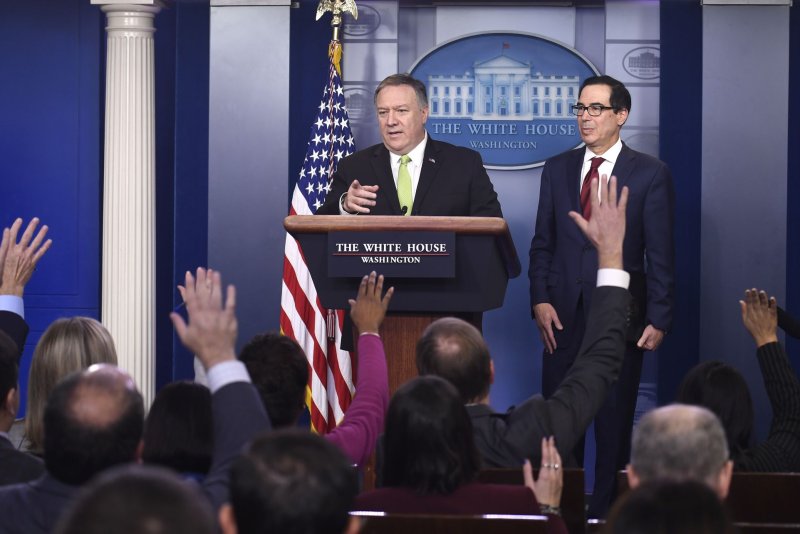U.S. Secretary of State Mike Pompeo (L) calls on a reporter Friday during a news conference with Treasury Secretary Steven Mnuchin, at which they announced new sanctions against Iran. Photo by Mike Theiler/UPI |
License Photo
Jan. 10 (UPI) -- The Trump administration formally announced new economic sanctions against Iran on Friday, as punishment for missile attacks Tehran carried out this week on two U.S. military bases in Iraq.
Secretary of State Mike Pompeo and Treasury Secretary Steven Mnuchin announced the new penalties at a White House briefing. The sanctions target Iran's largest steel, aluminum, copper and iron manufacturers, as well as eight individuals.
Pompeo and Mnuchin said the measures are also intended to hamper Iran's nuclear industry.
"The United States is targeting senior Iranian officials for their involvement and complicity in Tuesday's ballistic missile strikes," Mnuchin said.
"These sanctions will continue until the regime stops the funding of global terrorism and commits to never having nuclear weapons."
President Donald Trump promised new sanctions after Wednesday's attacks, which caused damage to the bases in Erbil and al-Assad but did not injure U.S. or coalition troops. The strikes were retaliatory for the U.S. drone strike last week that killed Iranian commander Qassem Soleimani in Baghdad.
Individuals named in Friday's action include Iranian national security official Ali Shamkhani, military deputy chief of staff Mohammad Reza Ashtiani and Islamic Revolutionary Guard chief Gholamreza Soleimani. Seventeen metals producers and mining companies and buyers of Iranian steel -- including Beijing-based Pamchel -- are also on the sanctions list.
Thursday, Iranian U.N. Ambassador Majid Takht Ravanchi said the missile attacks were not intended to kill any U.S. troops.
"We said before we took our military action that we would choose the timing and the place, and we chose the place where the attack against Soleimani was initiated," he told CNN. "We do not consider a high number of casualties as an instrumental element in our calculations."
He said the Iraq bases were chosen to show "we are capable of hitting the target where the plan to kill Soleimani was organized."
"We are not looking after killing Americans within this operation."
At a U.N. Security Council meeting Thursday, U.S. Ambassador Kelly Craft defended the strike that killed Soleimani as a justifiable act of self-defense. Iranian Foreign Minister Mohammad Javad Zarif was invited to attend the session but was denied U.S. entry.
Ravanchi, however, delivered Zarif's prepared remarks, in which he denounced U.S. sanctions as "economic terrorism."















